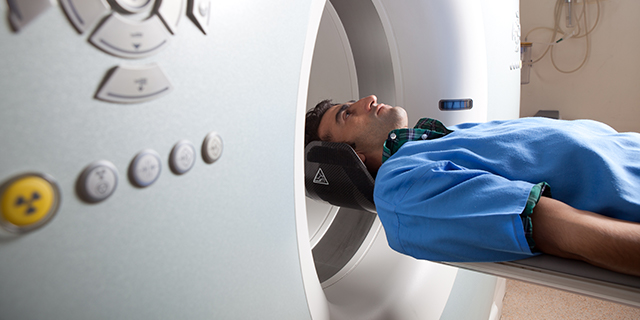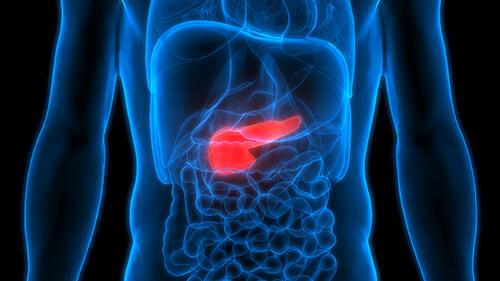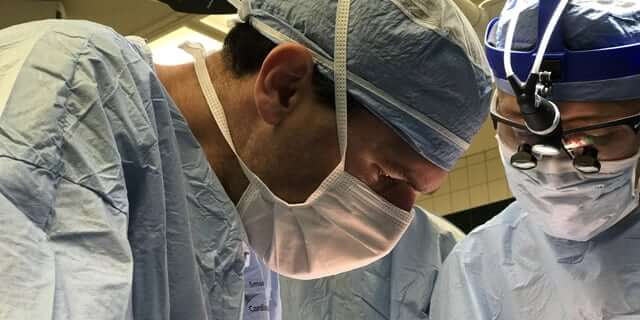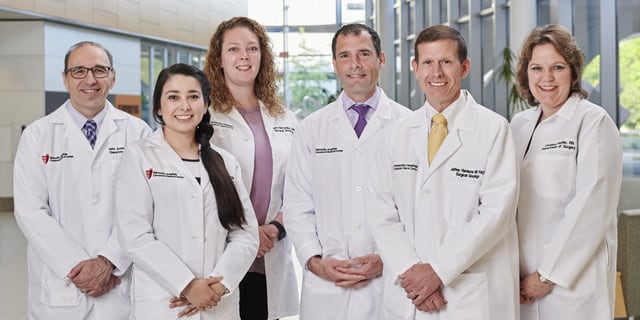Pancreatic Cancer Diagnosis & Treatment
Care That Centers Around the Patient
The pancreatic cancer experts at University Hospitals treat every patient like a member of their own family – offering compassionate care and support every step of the way, all while delivering the most advanced therapies available to treat pancreatic cancer.
Diagnosing Pancreatic Cancer

If a problem with the pancreas is found, our pancreas specialists can order a workup of the mass, which may include radiology scans such as computed tomography (CT), magnetic resonance imaging (MRI) and chest CT, a biopsy and blood work. These tests help us learn the stage (the extent) of the disease and guide your treatment plan.

Additional scans and bloodwork will be done throughout pancreatic cancer treatment to determine whether the treatment plan is working.
Leading-Edge Treatment Options for Pancreatic Cancer
Our cancer team meets weekly for a disease-specific tumor board review. During these meetings, we discuss patient cases and treatment options, to help guide cancer care decisions. Every patient has the support and resources of the entire team to guide his or her pancreatic cancer care decisions. This review process ensures that all realistic treatment options are considered for optimal results. The pancreatic cancer experts at the UH Seidman Cancer Center also team up and work with your local oncologists when necessary to ensure that you continue your care closer to home when patients desire. Our advanced treatments include:
- Surgery
-

Our experienced pancreas surgeons are highly skilled at performing procedures that can be part of your pancreatic cancer treatment plan. Pancreatic cancer surgery procedures include:
- Whipple procedure (pancreaticoduodenectomy), which removes the right part of the pancreas
- Distal pancreatectomy, which removes the left part of the pancreas
- Total pancreatectomy, which removes the entire pancreas (rare)
- Chemotherapy
-
The combination of chemotherapy drugs used during your cancer treatment will be determined by whether the pancreatic cancer is metastatic (has spread) or localized (confined to the pancreas).
- Radiation Therapy
-
Our radiation oncology experts offer radiation therapy that targets pancreatic cancer localized to the site of the tumor, which offers precise treatment while minimizing radiation exposure to healthy tissue.
- Clinical Trials
-
UH Seidman Cancer Center offers numerous pancreatic cancer clinical trials that give patients access to innovative therapies not yet available at other cancer centers, including immunotherapy and other treatments.
- Supportive and Integrative Medicine
-
UH offers evidence-based integrative medicine services that focus on managing pain and promoting overall well-being during cancer treatment and recovery. Integrative medicine services include:
Our Multidisciplinary Team Puts Patient First

At UH Seidman Cancer Center, we offer you a multidisciplinary team approach to care, which means our cancer doctors, nurses and support staff coordinate your care. Our team of fellowship-trained oncologists and surgeons offers leading-edge innovations in diagnostics and high-tech surgical techniques. Patients see multiple specialists who collaborate to create the most effective, comprehensive answer to pancreatic cancer treatment.
Pancreatic Cancer Team
Depending on the individualized care plan, team members may include:
- Medical oncologists
- Radiation oncologists
- Surgical oncologists
- Pancreas surgeons
- Dietitians
- Gastroenterologists
- Geneticists
- Integrative medicine providers
- Oncology nurses
- Radiologists
- Social workers
Follow-Up Care After Pancreatic Cancer Treatment
After you finish your treatment, your cancer care team will monitor you for signs of cancer recurrence and other health issues. Follow-up visits will often take place every three to four months, and then every six months for up to five years. Survivorship care may include in-person office visits and exams, imaging scans and bloodwork.
Comprehensive Cancer Center for the Most Advanced Care
UH Seidman Cancer Center is one of the nation’s leading freestanding cancer hospitals and is part of the National Cancer Institute-designated Case Comprehensive Cancer Center at Case Western Reserve University School of Medicine, which is one of an elite group of 50 comprehensive cancer hospitals nationwide. With groundbreaking clinical trials, UH Seidman Cancer Center’s physicians have established many innovations in special treatment of pancreatic cancer. Our entire multidisciplinary team evaluates and reviews every single case so diagnosis and treatment decisions are based on the knowledge of our team of experts. Together, we work through every step of pancreatic cancer care to ensure our patients are getting the best, most personalized treatment possible.
Medical Breakthroughs
Our team of pancreatic cancer physicians and researchers actively seeks to cure and improve treatment options for patients. Most recently, our team:
- Observed that an enzyme called wild-type IDH1 found in pancreatic cancer cells helps those cells survive in the nutrient-deprived conditions of the tumor. Also, our team found that the drug ivosidenib, which is already used to treat cancer with mutant IDH1 (about 1 percent of cases), may also be effective in treating the remaining 99 percent of cancers that have wild-type IDH1. Ivosidenib is being studied in a clinical trial at UH Seidman Cancer Center.
- Learned that high blood glucose levels make pancreatic cancer cells more sensitive to chemotherapy. We are studying this strategy to see if it can improve patient outcomes.
- Participated in a clinical trial that showed a drug used to treat non-small cell lung cancer is also effective against advanced pancreatic cancer with the KRAS p.G12C mutation.
Call 216-286-3870 or fill out the online form to schedule an appointment with a pancreatic cancer physician to discuss treatment options.


